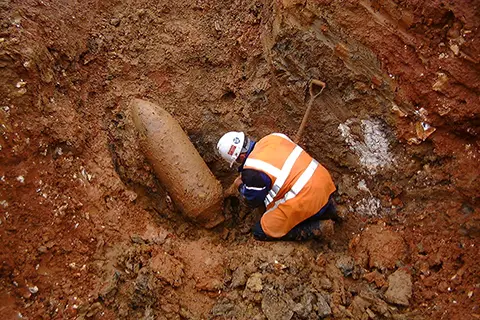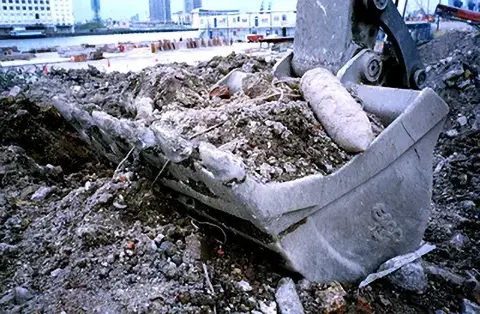Understanding Ground Penetrating Radar (GPR)
At Igne, we’re pleased to introduce our latest offering: a highly experienced survey department equipped with the latest ground penetrating radar (GPR) technology. Staffed by the most seasoned professionals in the industry, our GPR services are here to help you, our client efficiently locate buried services, avoid obstructions, and make informed decisions for your projects.
What is Ground Penetrating Radar?
Ground penetrating radar (GPR) is a non-invasive geophysical method that uses radar pulses to image beneath the surface of the ground. With the ability to detect buried objects and structures without the need for excavation, GPR has become an invaluable tool in a range of industries, from archaeology to utility management.
GPR works by sending electromagnetic waves into the ground, which reflect back when they hit an object, providing real-time data about what lies below.
The Applications of GPR
One of the major strengths of GPR is its versatility. It can be used in various applications, such as:
- Utility mapping: detecting buried cables, pipes, and other infrastructure without damaging the ground or nearby structures.
- Construction planning: ensuring that projects do not encounter unexpected obstacles that could cause delays or hazards.
- Archaeology: locating historical artefacts and structures while preserving the integrity of the site.
- Environmental assessments: investigating subsurface conditions, such as soil composition and groundwater levels.
The Benefits of GPR
The technology provides a number of benefits that make it a preferred method for subsurface exploration:
Non-destructive testing (NDT): GPR allows surveys to be conducted without digging, drilling, or otherwise disturbing the ground. This saves time and resources, while avoiding the potential risks associated with excavation.
High precision and accuracy: when handled by trained professionals, GPR delivers accurate data on the location and depth of buried objects. This is critical in avoiding damage to utilities and reducing the risk of costly accidents, such as cable strikes.
Adaptable to different materials: GPR can be applied to a wide range of materials, including soil, rock, concrete, and even ice, making it a valuable tool for numerous industries.
Real-time results: modern GPR systems provide immediate feedback, allowing surveyors to identify potential issues or features on the spot, enabling faster and more informed decision-making.
Cost Saving: GPR can be used to identify areas of interest meaning that Ground Investigation (GI) can be more targeted to areas where it is required, untimely saving the client time and money.
Limitations to Keep in Mind
While GPR offers significant advantages, it does have certain limitations that should be considered:
Depth penetration: GPR’s effectiveness diminishes with depth, particularly in certain types of soil or when high moisture content is present. Typically, it is most effective for shallow depths, often limited to a few metres.
Data interpretation: interpreting GPR data requires a high level of expertise. Our survey team at Igne has the skills and experience necessary to ensure accurate readings, even in complex scenarios where signals might overlap or reflect ambiguously.
Cost: Specialised GPR equipment, post processing software and skilled personnel are expensive. However, when you consider the potential savings in time and risk avoidance, GPR can be highly cost-effective.
Environmental and site conditions: the success of a GPR survey is influenced by environmental factors. Rocky, clay-rich soils or areas with high moisture levels can affect the accuracy of the results.
Surface access: GPR requires physical access to the surface for scanning, which can sometimes be a challenge in heavily built-up or restricted areas.
Why Choose Igne for GPR?
Igne’s survey department is not only equipped with the latest GPR technology but also staffed by some of the most experienced professionals in the field with over 80 years combined experience. Our team understands the intricacies of GPR data analysis and is skilled in adapting the technology to meet the unique needs of each project.
Whether you’re looking to map utilities, assess a construction site, or explore historical locations, we have the expertise to provide clear, actionable insights.
At Igne, we’re committed to delivering top-quality survey services, ensuring your projects stay on track, on time, and on budget.
Contact Richard Prescott and team today to find out how our GPR expertise can benefit your next project - richard.prescott@igne.com | 07525 641 401
Other articles of interest

What’s the value of UXO risk mitigation services?
What value do unexploded ordnance (UXO) risk mitigation services bring? What's the potential impact of UXO and who does it affect? Get all the answers to your frequently asked questions here.

Why is UXO still found in Rotherwas, Hereford?
Yesterday, a hand grenade was found in Rotherwas, Hereford. Why is unexploded ordnance (UXO) still found in Rotherwas, Hereford, over 70 years since WWII ended? Learn about Rotherwas' munitions factory, Luftwaffe bombings, and why UXO risk assessments are important for intrusive ground works.


